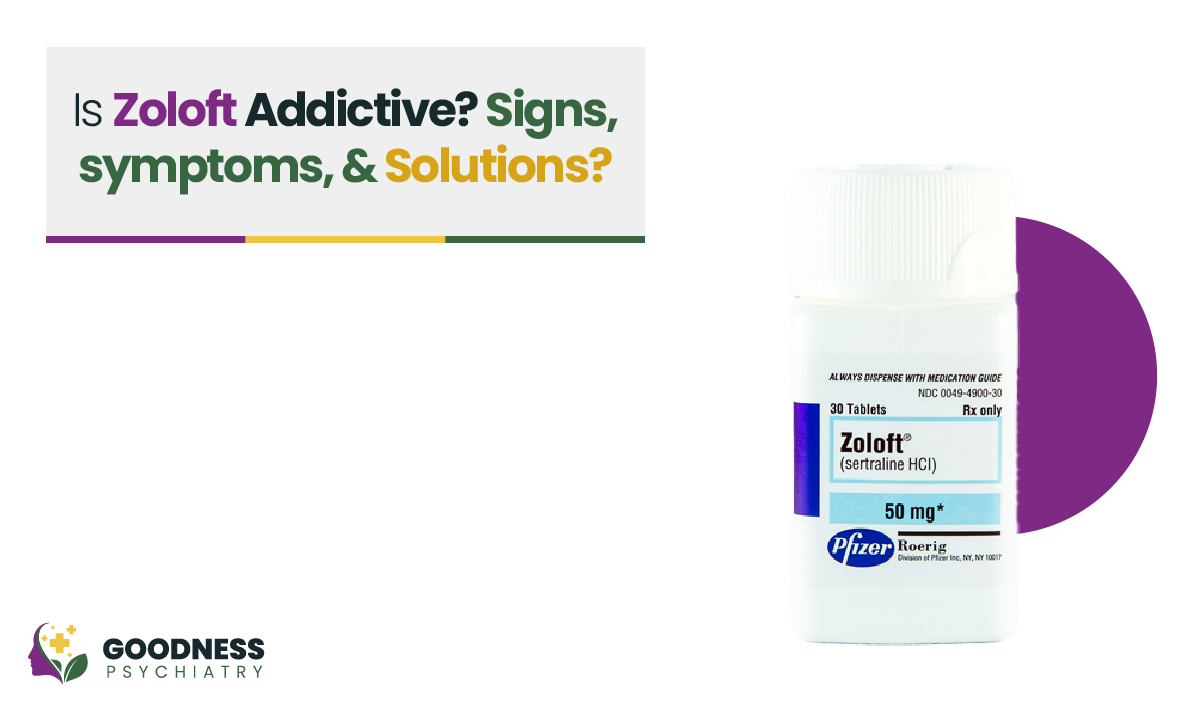Zoloft is often prescribed for mental disorders like depression and anxiety. It can be really helpful for people fighting these issues. Still, we must also pay attention to the downsides of misusing Zoloft.
Are you dealing with dependence on alcohol or harmful substance reliance? It’s important to begin healing, body and mind. Goodness Psychiatry can assist you.
It may cause dependency and addiction. Let’s look into that is Zoloft addictive?
What Is Zoloft?
Zoloft, also known as sertraline, is a Selective Serotonin Reuptake Inhibitor
(SSRI) drug used to help with depression, anxiety, PTSD, and OCD. It helps by increasing the serotonin levels in the brain. With more of this hormone, mood, and emotional balance often improve.
However, caution is crucial because an overdose might lead to complications, like sleep issues. If you’re facing difficulties, go to your doctor before altering your doses. They can guide you in deciding the right way for you, ensuring your safety.
Is Zoloft Addictive?
Zoloft is not addictive, but you should only take it as your doctor instructs. You might not be safe if you take too much or stop all of a sudden. This could cause problems like withdrawal signs.
Do not be afraid to talk to your doctor if you have any concerns or questions about taking Zoloft. They can help you figure out what to do if you’re worried about any risks and how they might affect you.
Zoloft Side Effects
Zoloft can occasionally cause side effects for some people.
Don’t mix up addiction signs with side effects. Side effects come and go, unlike addiction signs. Monitoring any unusual changes and informing your doctor if you spot any is important. A minor but existent fraction of users under 25 might notice a worsening or intensification of their depression symptoms. Yet, even then, it’s quite rare.
Some frequently noticed Zoloft side effects are:
- Dry mouth
- Tiredness
- Headache
- Changes in sleep patterns
- Nausea or diarrhea
Discuss these symptoms with your doctor. They might adjust your dosage or suggest a completely new antidepressant. Some people, without any medical advice, increase their dosage, considering it will minimize their symptoms. It’s important to always consult with your doctor before attempting to adjust lowest dose of Zoloft or high.
Signs and Symptoms of Dependence on Zoloft
The physical dependence on Zoloft can show several signs and symptoms.
Even though Zoloft isn’t usually addictive, some people might start needing it physically.
Common Zoloft Withdrawal Symptoms
If their bodies get used to the medicine, they could feel withdrawal symptoms when the dose lessens or if they stop suddenly. When they stop using Zoloft, they could feel dizzy or lightheaded often. Stomach discomfort or feeling nauseous is also common.
Many might get headaches more often. Some could also feel moody or irritable as their bodies adjust to not having the medicine. Others might feel more tired or sluggish than usual.
Psychological Signs
There are also psychological signs. These could include increased anxiety levels, depression symptoms returning or getting worse, and sleeping disorders or full-blown insomnia during the Zoloft withdrawal process.
Solutions and Management
Gradual Tapering
Slow Reduction and Maintenance Scrutinize the Zoloft withdrawal slowly and steadily under the doctor’s control to reduce withdrawal effects. If the medication stops suddenly, intense withdrawal impacts can hit.
Professional Support
Looking for a health professional’s advice is a must. They can arrange a reduced schedule and be there throughout the journey. In some scenarios, changing to another antidepressant could be suggested.
Monitoring and Adjustments
Checking regularly with your health professional is crucial. They can oversee your advancement, tweak your reduction plan if required, and deal with any issues.
Lifestyle Changes
Promoting good habits can enhance your mental health.
- Keeping Active: Regular movement can enhance mood and reduce withdrawal trouble.
- Nutritious Meals: Consuming a balanced diet aids overall health.
- Mindfulness Methods: Practices like calm reflection and yoga can be beneficial for handling tension and worry.
- `A Joining a support group, whether online or in person, can provide practical advice and emotional support from people who have been there before.
Conclusion
Is Zoloft Addictive?
Zoloft, although not commonly considered addictive, can result in physical dependence.
Cutting down slowly, getting help from experts, and changing daily habits can help control this need and make coming off the medicine easier.
If you or a person you care about finds dependence on Zoloft hard, it’s best to reach out to professionals for help.
FAQs
What happens when you stop taking Zoloft?
When you stop, you may feel dizzy, sick, get headaches, see mood changes, feel tired, be more anxious or sad, and can’t sleep.
What is a safe way to stop Zoloft?
The safest way to stop is to slowly lower the dose under the direction of a healthcare provider.
Can certain life changes help when stopping Zoloft?
Yes, if you exercise regularly, eat well, and practice things like yoga and meditation, it can help your mental health and lessen withdrawal.
Should I talk to a doctor before I stop taking Zoloft?
Talking to a healthcare professional is key to planning a safe stop and dealing with any symptoms of withdrawal.

